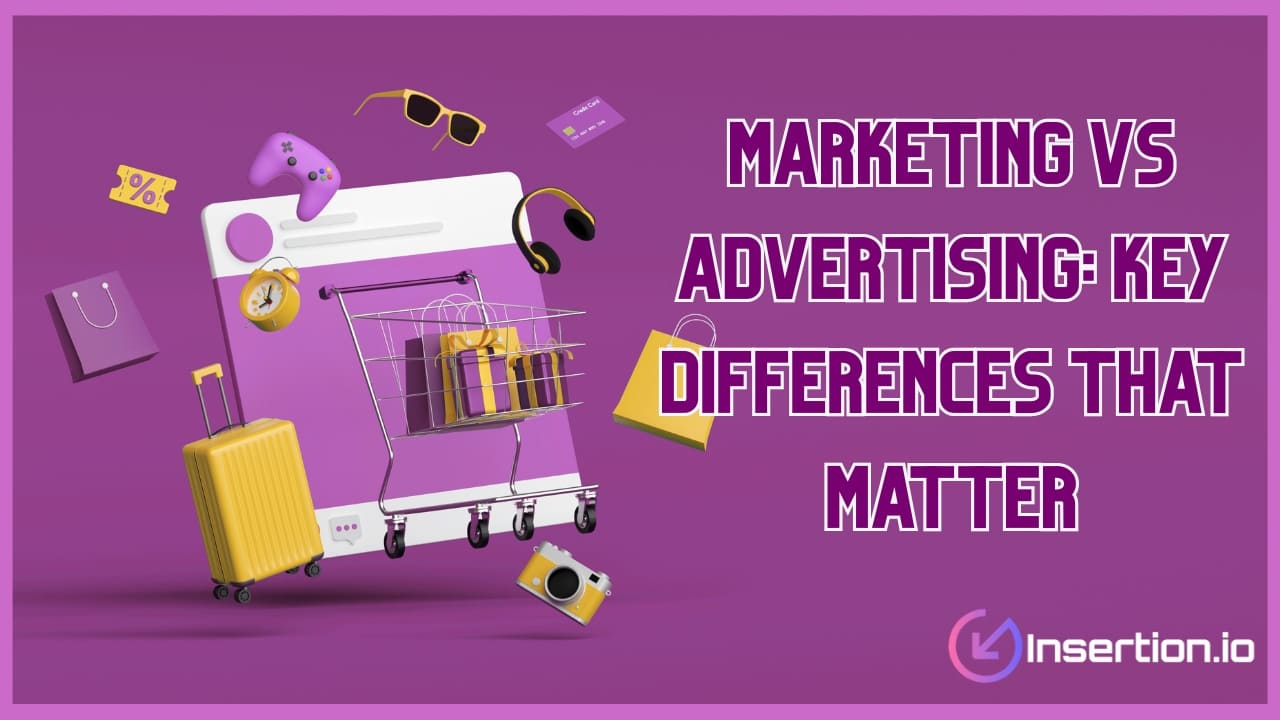
Many businesses confuse marketing vs advertising, leading to wasted resources and unclear brand positioning. Research shows businesses that clearly distinguish between broader marketing activities and focused ad campaigns achieve stronger brand recognition and sustained growth. This article resolves that confusion by outlining how marketing strategies, such as content marketing, market research, product development, and public relations, form a comprehensive foundation, while advertising strategies, such as digital advertising, outdoor advertising, and mobile advertising, execute targeted promotional messages using paid media.
The comprehensive guide below clarifies the key differences between marketing and advertising, including the types of marketing and advertising, and how to align both for success.
What Is Marketing and Why Is It Important?

Marketing refers to a broader marketing approach that involves strategies, channels, and activities supporting a product or service. It is a component of marketing that focuses on building brand recognition, establishing connections, and achieving marketing goals effectively. Marketing activities include market research, promotion, content marketing, and advertising campaigns that enhance overall marketing efforts. A solid marketing plan ensures the marketing team aligns advertising investments with long-term marketing aims. Marketing and advertising are often linked, but advertising is a subset of marketing that involves paid media. A successful marketing strategy eventually improves customer loyalty, strengthens the marketing mix, and drives business growth.
What Is Advertising and Why Is It Necessary?

Advertising is a subset of marketing that involves promoting a product or service through paid media. It is a component of marketing that focuses on advertising campaigns designed to achieve specific marketing goals. Advertising efforts include digital advertising, traditional advertising, mobile advertising, and outdoor advertising across multiple advertising platforms. Advertising is a part of overall marketing activities that support your marketing plan and broader marketing aims. A successful advertising campaign enhances brand recognition, boosts return on ad spend, and reinforces marketing and advertising efforts. Effective advertising strategies, such as social media ads and native advertising, consequently support successful marketing.
Difference Between Marketing vs Advertising
| Aspect | Marketing | Advertising |
|---|---|---|
| Definition | Marketing encompasses a broader approach that includes strategies, promotion, and product development. | Advertising is a subset of marketing that involves paid media to promote a product or service. |
| Scope | Marketing is a broader concept that involves marketing activities, marketing channels, and overall marketing efforts. | Advertising is a component of marketing that focuses specifically on advertising campaigns and ad platforms. |
| Key Differences | Marketing involves conducting market research, managing public relations, creating content, and utilizing social media marketing simultaneously. | Advertising involves digital advertising, traditional advertising, outdoor advertising, and mobile advertising campaigns. |
| Goal | Marketing aims at building brand recognition, achieving marketing goals, and creating a successful marketing strategy. | The goal of advertising is to promote quickly, increase sales, and improve return on ad spend. |
| Strategies | Marketing strategies include influencer marketing, affiliate marketing, email marketing, and marketing automation platforms. | Advertising strategies include media buying, native advertising, paid media, and targeted advertising techniques. |
| Timeframe | Marketing takes a long-term approach and supports your marketing plan with sustainable marketing efforts. | Advertising is often short-term, focusing on a single ad campaign or a successful advertising campaign. |
| Relation | Marketing and advertising are often connected, but marketing is a larger umbrella of marketing activities. | Advertising is a part of marketing that focuses chiefly on advertising to promote products. |
| Execution | Marketing utilizes the marketing mix, marketing tools, and a dedicated marketing team to develop effective marketing campaigns. | Advertising focuses on social media ads, digital media placements, and outdoor advertising platforms. |
| Result | Successful marketing and advertising together ensure stronger brand recognition and long-lasting customer relationships. | A successful advertising campaign drives immediate attention, supports your marketing, and strengthens advertising and marketing efforts. |
What Are Several Common Types of Marketing vs Advertising
Marketing vs advertising often highlights key differences between broader marketing activities and specific advertising efforts. Marketing refers to a larger umbrella of marketing that involves strategies, promotion, product development, and brand recognition. Advertising is a subset of marketing that focuses on paid media, ad campaigns, and advertising platforms. Both play vital roles, albeit with different scopes, in shaping successful marketing and advertising strategies.
Marketing:
- Digital Marketing: Digital marketing uses digital media, marketing channels, and marketing automation platforms to strengthen overall marketing efforts effectively.
- Social Media Marketing: Social media marketing includes social media ads and campaigns that support your marketing and enhance customer engagement.
- Global Marketing: Global marketing involves marketing activities across international platforms, comparatively adjusting marketing strategies to diverse consumer preferences.
- Relationship Marketing: Relationship marketing aims at building brand recognition through marketing that focuses on promoting long-term customer loyalty.
- Brand Management: Brand management is a component of marketing that involves marketing campaigns, enhancing brand value, and overall marketing goals.
- Product Development: Product development is part of marketing that involves market research, public relations, and promotion for innovation.
Advertising:
- Traditional Advertising: Traditional advertising involves forms of advertising like print media, TV, and radio advertising platforms.
- Retail Advertising: Retail advertising campaigns are advertising efforts that focus chiefly on local customers and immediate sales growth.
- Online Advertising: Online advertising includes digital advertising, native advertising, and affiliate marketing across various online advertising platforms.
- Mobile Advertising: Mobile advertising uses social media ads, digital platforms, and mobile apps to target consumers specifically.
- Outdoor Advertising: Outdoor advertising is a form of advertising that involves billboards, posters, and signage in public spaces.
- Pay Per Click (PPC) Advertising: PPC advertising is an advertising technique based on media buying, return on ad spend, and conversions.
Conclusion
This guide clarified how marketing refers to a larger role, guiding overall marketing activities, developing a marketing plan, and shaping the marketing mix, while advertising is a subset of marketing, focused on paid ads, specific advertising campaigns, and achieving quick visibility. By aligning marketing goals, such as brand recognition, content marketing, social media marketing, and email marketing, with advertising efforts, such as pay-per-click, native advertising, outdoor advertising, and mobile advertising, brands can achieve both immediate results and long-term growth. Were there sections you’d like elaborated, or examples tailored to your brand’s marketing and advertising strategies?
FAQs
What is marketing?
Marketing is the process of promoting, selling, and distributing a product or service to consumers.
What is advertising?
Advertising is paid communication designed to promote a product, service, or brand to an audience.
Are marketing and advertising the same?
No, marketing is broader, while advertising is one component within the marketing process.
Why do businesses need marketing?
Businesses need marketing to build relationships, understand customers, and achieve long-term growth.
Why do businesses need advertising?
Businesses need advertising to spread awareness, attract attention, and increase immediate sales.
Which comes first: marketing or advertising?
Marketing comes first because it defines the strategy, while advertising executes part of that plan.





Leave a Comment